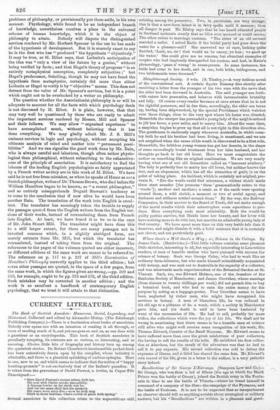Shingleborough Society. 3 vole. (S. Tinsley.)—A very tedious novel of
the conventional sort. A certain Squire Ramsay dies shortly after receiving a letter from the younger of his two sons with the news that the elder had been drowned in Australia. The said younger son forth- with enters into possession, and behaves with inconceivable brutality and folly. Of course every reader becomes at once aware that ho is not the rightful possessor, and in due time, accordingly, the elder son turns up, having been shipwrecked, by the special Providence which watches over these things, close to the very spot where his home was situated. Meanwhile the usurper has persuaded a young lady of the neighbourhood to jilt her lover, a poor sailor, and to marry him. About tho same time, a suspicion begins to grow up that all is not right in this direction also. The gentleman is ominously angry whenever Australia, in which coun- try both he and his brother had been living, is mentioned, and we are not surprised when the cause of his wrath is discovered to be a first wife. Meanwhile, the faithless young woman has got her deserts, in the shape of some exceedingly brutal treatment from her false husband, and her thoughts go back to her old lover. Here we must congratulate the author on something like an original combination. We are very nearly having what one of our old dramatists called an "innocent adultery." The lady is perfectly free to marry her old lover, but neither knows the fact, and an elopement, which has all the attraction of guilt, is on the point of taking place. An incident, which is certainly not original, pre- vents it. "Ere the words could find utterance, a violent shock made them start asunder [the pronoun them' grammatically refers to the words ] ; another and another ; a crash as if the earth were opening around them, a wild shriek, a moment or two of awful agony, and darkness and stillness settled around them." By the way, the Railway Companies, in their answer to the Board of Trade, did not make enough of the moral results which their catastrophes seem semetimes to pro- duce. Here everything ends most admirably. Both the would-be guilty parties survive, but Mande loses her beauty, and her lover will have nothing more to do with her, but marries an admirable young lady of that country. We have spent more time on this very feeble tale than it deserves, and might dismiss it with a brief sentence that it is certainly not clever, and not particularly good.


































 Previous page
Previous page